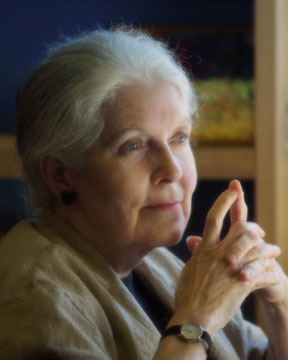In Memoriam: Suzette Haden Elgin

For some reason, I don't recall ever hearing the news that Suzette Haden Elgin passed away a few years ago.
I cannot say I was surprised, when I looked up her activities for the first time in several years, and found her obituary. The last I knew (circa 2013), she had succumbed to Alzheimer's. Still, I feel like it should have taken me less than four years to notice that an author who left as great an impression on me as she did had passed.
I wrote a lengthy review of her Ozark Trilogy back in 2013, in which I talked a lot about her writings and how they influenced me. Specifically, how I "borrowed" her Ozarkers for my Alexandra Quick series. Not just the idea of Ozarkers as a magical subculture, but much of the lore you have already seen in AQ - the rhymes, the Hollers, the Grannies, Troublesome and Responsible, and more stuff you will see in AQATWA, I totally and shamelessly lifted wholesale from Elgin's books.
They are pretty goofy books, and while I think they're worth reading, I wouldn't exactly recommend them as must-read SF classics. But something about them enchanted me and captured my imagination, and so for all of you who have said Constance and Forbearance are among your favorite AQ characters, you have Suzette Haden Elgin to thank for inspiring them.
The Ozark trilogy wasn't actually the first series I read by her. Her Native Tongue trilogy is better known. I picked up the first book while I was studying linguistics myself, and thought an entire novel about xenolinguistics, in which linguists were the protagonists, sounded cool.
And, reading it in the late 80s, I thought, "Wow, this is some crazy shit."

Native Tongue came out a year before Margaret Atwood's The Handmaid's Tale, but clearly tapped into the same Reagan-era angst over women's rights. Both of them present a dystopian vision of a future U.S. where women have lost all rights, but where The Handmaid's Tale was written as a political allegory, Native Tongue was pure "speculative fiction" (as Atwood might say) and "thought experiment" (as Elgin might say), being set in the 22nd century and involving pure SF concepts like space travel and aliens.

I can't say it's an injustice to Elgin that her series never became a blockbuster TV series; frankly, Atwood was a better writer, and while book one of the Native Tongue series was interesting and imaginative in the best way, it was also a nonsensical polemic in the worst way. Book two was worse, and book three was practically incoherent. My recollection of Earthsong was that it was less a novel than a collection of vignettes revolving around a few interesting ideas and only vaguely related to the plot of the first two books.

Elgin also wrote books about her conlang, Láadan, and I still have my copy of her A First Dictionary and Grammar of Láadan.

Looking over her bibliography, I actually own and have read almost everything she wrote, including non-fiction. Was she my favorite author? No. I enjoyed all her novels, but they were all, well, very much products of her era and a little goofy at times.

Her Coyote Jones series, for example, is very, very 70s sci-fi. At times she seemed to be writing almost as an anti-Heinlein. And when she wrote a cross-over between her Ozarker series and her Coyote Jones series, well, it was kind of a mess, if a sweet, enjoyable mess.
I may sound like I am damning with faint praise. Suzette Haden Elgin was a brilliant and accomplished woman, but her books were not everyone's cup of tea and she was writing for a very select audience. Not many readers, especially mainstream SF fans, "got" her. I am not sure I did, but she surely left an impression on me. Enough of an impression that I feel obliged to write a memorial for her, even though she died in 2015.